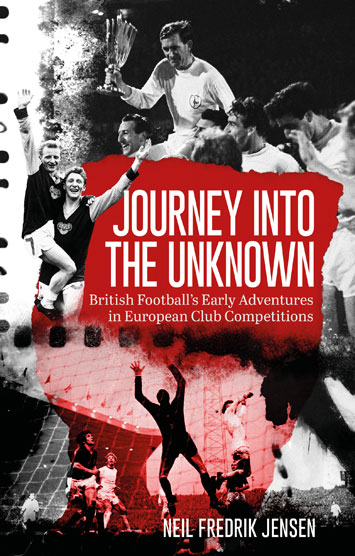Journey Into the Unknown by Neil Fredrik Jensen – Review

By Karl Hornsey
Neil Jensen’s latest offering is a look back at the early stages of British football clubs’ adventures in European football, from the mid-1950s through to a suitable, if tragic, pause in 1985. It’s a fascinating read as well, in part because it opens a window on a very different era, when little was known about foreign and seemingly exotic opposition, but also as a contrast to the present day, when football has reached saturation point and the much-touted European Super League still lurks in the background.
The book also mixes examples of almost comic amateurism across all levels of the game, with tales of wonderful drama, as well as touching on some of the most tragic episodes in the sport, building up a picture of European competitions that gradually took hold in the British psyche. The ‘stiff upper lip’ approach looms large over the opening chapters, as innovative characters such as Sir Matt Busby helped to push the concept of playing against the best that Europe had to offer, while the stuffed shirts still maintained the opinion that British was best and that the nation had little to learn from the fancy ways and ideas coming from the continent. A double battering for the English national team at the hands of the Mighty Magyars in 1953 and ‘54 started to at least open eyes to the concept that we were slipping light years behind as a footballing force.
Jensen provides a light touch where necessary and details in great depth some of the adventures of those clubs who many would be surprised had even sampled European football, let alone reached semi-finals and finals when the competitions were in their infancy. Some of the bigger characters in British football loom large as the years go by, with Jock Stein, Don Revie and Brian Clough all keen advocates of testing themselves against the leading clubs across Europe, and the remarkable successes of the lesser lights of Aston Villa and Nottingham Forest, to name but two, are excellently chronicled.
 “Foreboding knowledge”
“Foreboding knowledge”
As with any good book on football of the past, Jensen sets the action against the wider backdrop of society, which resonates particularly in this instance as the reader has the foreboding knowledge of how this story ends. The advent and growth of hooliganism during the 1970s was a blight on the game in this country, and transferred into clashes with continental rivals, who could give as good as they got in the violence stakes both on and off the field.
Fixtures between British and European clubs have been littered with astonishing acts of violence that simply wouldn’t be attempted these days, let alone tolerated, but the final straw off the field came in the decrepit Heysel Stadium in Brussels in 1985. Remarkably, the European Cup final between Liverpool and Juventus still went ahead, despite the scores of fans killed before the game, but that was it as far as English clubs in Europe were concerned until 1990, when their ban ended.
I would like to have read more about the imposition of the ban and how it affected clubs, as well as more about Heysel itself, but other than that minor quibble, this is a thoroughly enjoyable read about football that feels like it came from a different planet, let alone a different era.
‘Journey Into the Unknown’ by Neil Fredrik Jensen is published by Pitch Publishing
Frequently Asked Questions about Journey Into the Unknown by Neil Fredrik Jensen
What is the book about?
It charts British clubs’ first adventures in European competition, blending on-pitch drama with boardroom attitudes, culture clashes and changing fan behaviour.
What years does it cover?
From the mid-1950s – when European tournaments began to grip the British imagination – to a natural, tragic pause in 1985.
Why does the narrative pause in 1985?
The story culminates with the Heysel Stadium disaster and the subsequent ban on English clubs in Europe, which lasted until 1990.
Which managers and clubs feature prominently?
Figures such as Sir Matt Busby, Jock Stein, Don Revie and Brian Clough, with notable chapters on Aston Villa and Nottingham Forest’s European successes.
Does it include lesser-known European runs?
Yes. Jensen highlights clubs readers may be surprised to learn reached latter stages in the early years of the competitions.
How does the book handle wider social context?
It sets the football narrative against societal change, including the rise of hooliganism in the 1970s and its impact at home and abroad.
What is the writing style like?
Accessible and well-researched: light where appropriate, detailed when needed, and attentive to the period’s characters and controversies.
How does it compare with modern football?
It contrasts the mystery and novelty of early European ties with today’s saturated calendar and ongoing talk of a European Super League.
Are there any criticisms raised in the review?
A minor quibble: the reviewer would have welcomed more on the European ban’s implementation and the specifics around Heysel.
Who is the author and who publishes the book?
Written by Neil Fredrik Jensen and published by Pitch Publishing.
Who will enjoy this book?
Fans of football history, readers interested in European competitions’ origins, and anyone curious about how British clubs adapted to the continental game.










